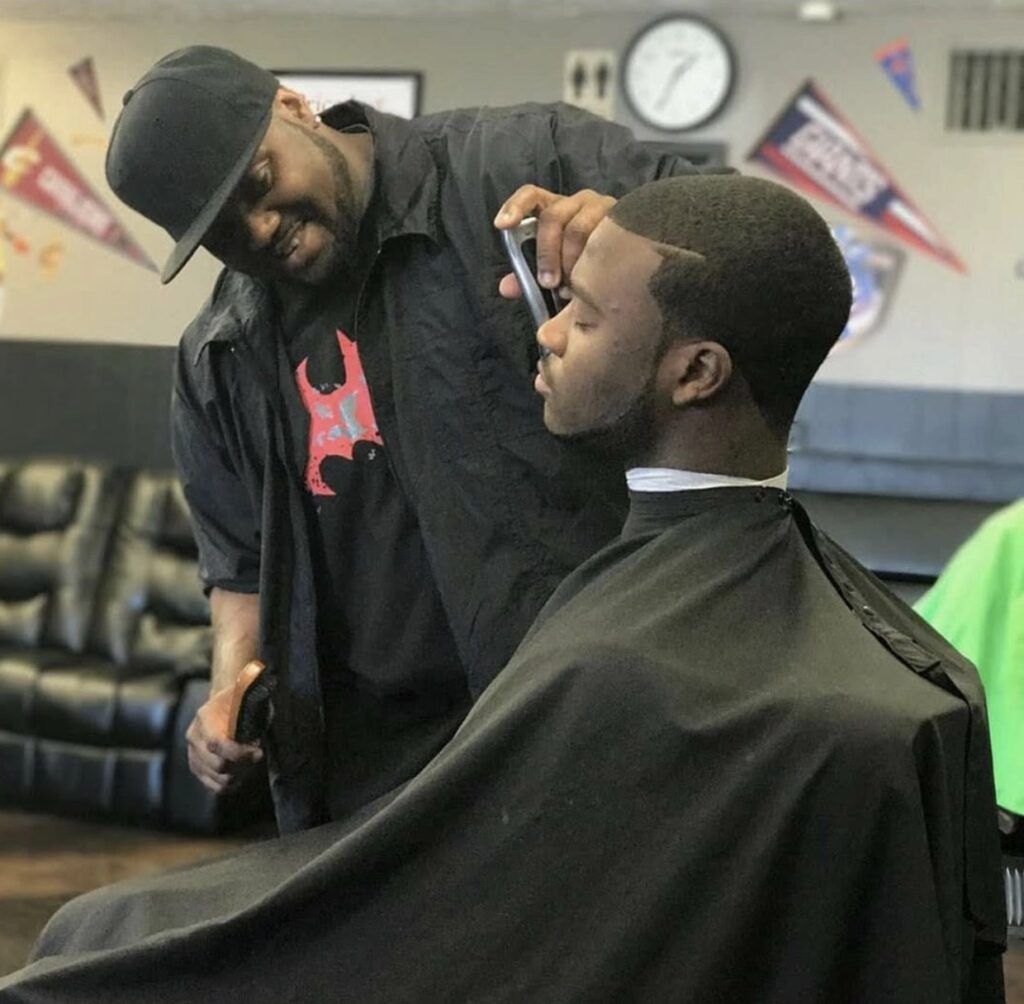At first glance, combs are lined up, clippers are buzzing and locks of hair are swept from the floor after a haircut, just like any other barber shop. But within the doors of Black-owned barber shops, there is more than a new cut at the ready.

Black-owned barbershops have long played a crucial role in African American life. For a member of the Black community, a barber is someone who can be trusted to handle more than just a pair of clippers.
Black-owned barbershops weclome their communities to come in and stay awhile. It’s often a safe place where African Americans feel they can let their guard down and talk freely about their lives.
ManCave, located in Clearfield, is a Black-owned barbershop where visitors come for more than a haircut. In addition to the barber stations, the space is filled with couches, a dart board and a pool table, all of which make the space more of a place to hang out than to
simply get a cut.
“A trip to the shop is a way of connecting with people,” Kevin Mickinzie, a Black barber at ManCave Barbershop, said.
Marcus Johnson, owner of ManCave, said that he strives to provide an environment where those who enter feel welcomed, respected and inspired. Growing up in the South, he recalls spending much of his time at the local barbershop.
“The barbershop was a place I could go without my parents worrying about me,” Johnson said.
The people there were role models for him as a young boy. Johnson learned how to play checkers and picked up life lessons from his hours at the barbershop.
Both Mickinzie and Johnson described the local barbershop as the cornerstone of Black communities. Barbershops were one of the first ways African American men became entrepreneurs.
In his book, “Cutting Along the Color Line,” Quincy T. Mills examines the historical impact of barbershops.
“They were doing more than making men look good; they were making Black men look good, acceptable and employable,” Mills wrote.
Throughout the years, Black barbershops have given Black men something they were unlikely to get elsewhere: a place to experience Black culture and history.
Black-owned barbershops continue to demonstrate their unique contribution to society.
Matthew Moore, who used to be a barber and visited barbershops growing up, said the existence of Black-owned barbershops teaches young Black children they have many career prospects.
“Our community has severe trauma due to poverty and violence,” Moore continued. “Barbershops are seen as a sanctuary because barbers are respected and trusted in our community.”
In addition to poverty and violence, the African American population continues to experience high rates of life-threatening health issues.
“Black men have the highest rates of high blood pressure related disability and death of any group in the United States,” Dr. Ronald G. Victor, an expert in hypertension, said.
Despite this fact, Black men are less likely than others to see a doctor because of a lack of trust in the medical community and less access to healthcare. Barbershops have been seen as a way to address this issue.
Victor found in a study that adding hypertension programs into an estimated 18,000 African-American barbershops across the country would result in 800 fewer heart attacks, 550 fewer strokes and 900 fewer deaths in the first year alone.
In several ways, the environment created in a barbershop makes it the ideal place to manage certain health issues that disproportionately affect Black men. Participants in this study received guidance from their barber to see a doctor, which contributed to the positive results.
Mickinzie can say from experience that giving sound advice is well received among clients. Mickinzie recounted a time when one of his client’s was having a hard time with his son. He reached out to Mickinzie for support.
“He asked me to go to his son’s school to speak with him about making better decisions and getting back on the right track,” Mickinzie said.
Mickinzie was more than willing to make the visit and his conversation with his client’s son was effective. Mickinzie sees it as part of the job.
“As an African American, in your barber you’ll find a father figure, a friend, a counselor and someone you can trust with more than just your hair,” Mickinzie said.







